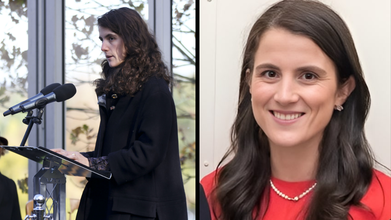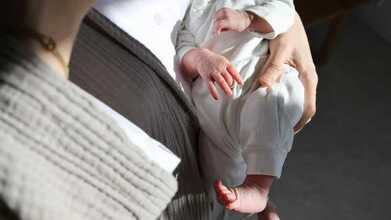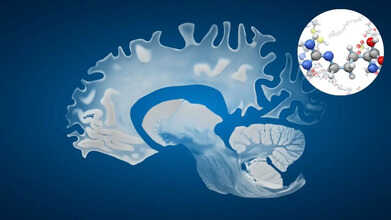- Health Conditions A-Z
- Health & Wellness
- Nutrition
- Fitness
- Health News
- Ayurveda
- Videos
- Medicine A-Z
- Parenting
Donald Glover Opens Up About A Stroke He Had On Childish Gambino’s 2024 Tour

Credits: Wikimedia Commons
Donald Glover, who formerly performed under the stage name of Childish Gambino revealed that he had a stroke last year due to which he had to cancel his world tour date. Now, 42, he said he is dealing with an "ailment", after the New Orleans performance. He revealed that after that performance, he had gone to hospital in Houston, where he discovered that his condition required surgery.
As a result, he postponed his tour, which eventually was cancelled. This tour was remainder of his US tour and his UK, European, and Australian tour dates. He wrote: "Unfortunately, my path to recovery is taking longer than expected."
While performing at Tyler, the Creator’s Camp Flog Gnaw festival in Los Angeles on Saturday, Glover shared the real reason behind his sudden tour halt.
“I was doing this world tour … really loving seeing you guys,” he said, as reported in Guardian. “I had a really bad pain in my head in Louisiana and did the show anyway. I couldn’t really see well, so when we went to Houston, I went to the hospital and the doctor was like, ‘You had a stroke.’”
He joked that his first thought was, “Here I am still copying Jamie Foxx,” referencing Foxx’s 2023 stroke, before admitting his immediate fear was that he was letting fans down—though he knows that isn’t true.
Glover added that doctors also found he had a broken foot and a hole in his heart, which required two surgeries.
“They say everybody has two lives, and the second starts when you realize you only have one,” he told the crowd. “You’ve got one life, guys, and the life I’ve lived with you has been such a blessing.”
Glover, a five-time Grammy winner, has since retired the Childish Gambino moniker after releasing his final album, Bando Stone & the New World. The cancelled tour had been planned as his farewell to the stage name.
What Happens In A Stroke?
When you have a stroke, the blood supply to part of your brain is interrupted. This cause brain cells to die from a lack of oxygen and nutrients. This could also lead to lasting brain damage, long-term disability, or even death.
What Does It Mean To Have A Hole In Heart?
As per Cleveland Clinic, hole in heart means to have an atrial septal defect or ASD, which is an opening in the wall that separates the heart's chambers. While some small holes may close on their own and have no symptoms, larger holes can cause blood to mix between oxygenated and deoxygenated sides, forcing the heart to work harder and potentially leading to health issues like shortness of breath. Treatment options range from monitoring to surgery or minimally invasive procedures, depending on the size and severity of the defect.
Types of holes in the heart
- Atrial Septal Defect (ASD): A hole in the wall (septum) between the two upper chambers (atria) of the heart.
- Ventricular Septal Defect (VSD): A hole in the wall between the two lower chambers (ventricles).
- Patent Foramen Ovale (PFO): A common type of ASD, where the opening between the atria doesn't close after birth.
What Happens When Someone Has A Hole In Their Heart?
- Normally, the left side of the heart pumps oxygen-rich blood to the body, and the right side pumps oxygen-poor blood to the lungs.
- A hole in the heart allows oxygen-rich and oxygen-poor blood to mix.
- This can cause oxygen-rich blood to recirculate to the lungs instead of the body, or cause the heart to pump extra blood to the lungs.
Tatiana Schlossberg, JFK's Granddaughter Who Has A Rare Blood Cancer Says The Healthcare System Under RFK Jr Feels 'Strained, Shaky'

Credits: Wikimedia Commons
Tatiana Schlossberg, the granddaughter of President John F Kennedy and daughter of Caroline Kennedy says the health care system that she wanted to rely on felt "strained, shaky". It has been eight months into her treatment for a rare blood cancer. This was confirmed by a New Yorker essay she wrote on November 12, where she revealed that she had less than a year to live. However, she did that her cousin Robert F Kennedy Jr. as the US Health and Human Services secretary's actions have and will pose negative impact on cancer patients and on its medical research.
She wrote: "As I spent more and more of my life under the care of doctors, nurses, and researchers striving to improve the lives of others, I watched as Bobby cut nearly a half billion dollars for research into mRNA vaccines, technology that could be used against certain cancers. Slashed billions in funding from the National Institutes of Health, the world’s largest sponsor of medical research."
In her essay she noted that doctors and scientists at Columbia University, where her husband worked as urologist, and Columbia Presbyterian hospital, where she was being treated initially, did not know if they would be able to continue their research or even have jobs. "In May, the university laid off a hundred and eighty researchers after federal-funding cuts," she wrote.
What Condition Does Tatiana Schlossberg Have?
She was diagnosed with acute myeloid leukemia, with a rare mutation called Inversion 3, when she was 34. This diagnosis came just hours after she delivered her second child, a daughter.
The journal Leukemia & Lymphoma notes acute myeloid leukemia (AML) is a complex hematological malignancy characterized by diverse genetic alterations, each with distinct clinical implications. Chromosome 3 inversion (inv(3)) is a rare genetic anomaly found in approximately 1.4–1.6% of AML cases, which profoundly affects prognosis. As per Cleveland Clinic, "the type Tatiana Schlossberg has is considered the rarest and most serious form because of a genetic flaw called Inversion 3."
In her essay she also noted that in standard treatments, there is no guarantee for a cure.
What Happens In AML Type 3?
It means a section of one of her chromosomes is arranged incorrectly, causing cancer cells to grow out of control and making the disease incredibly difficult to treat. Experts consider this one of the highest-risk forms of AML because it usually doesn’t respond well to standard chemotherapy, and even aggressive options like stem-cell transplants often aren’t enough.
Fund Cuts Under RFK Jr's Health Ministry
In March, Kennedy rolled out a major restructuring plan that merged several divisions and cut 20,000 full-time jobs, saying the move would save taxpayers $1.8 billion annually. He also reduced the Department of Health and Human Services’ 2026 budget to $94.7 billion, down from $127.6 billion in 2025.
Kennedy has repeatedly insisted that he’s targeting bureaucracy rather than scientific research, and has said that some grants frozen by mistake would be restored. As of Nov. 21, HHS has reinstated about 52%—or 2,860—of the NIH grants that were initially terminated, according to Grant Witness, which tracks the process. Still, more than 2,600 grants remain affected.
Back in August, Kennedy described mRNA vaccine technology as “ineffective” and claimed it carried more risks than benefits. He said this decision would affect 22 projects—worth nearly $500 million—at the Biomedical Advanced Research and Development Authority, which supports companies in developing vaccines, drugs, and diagnostic tools for public health emergencies.
Breastmilk In Parts Of Bihar Found Contaminated With Uranium – How It Could Affect Newborns?

Credits: Canva
A new scientific investigation has drawn attention to alarming levels of uranium in the breastmilk of nursing mothers across six districts in Bihar. The findings suggest possible health risks for infants who depend entirely on breastmilk in their first months.
Published in Scientific Reports, the study is the first to examine uranium contamination in breastmilk from the Gangetic belt of Bihar, a region already known for widespread exposure to arsenic, lead, mercury and other heavy metals.
Researchers collected breastmilk samples from 40 mothers aged 17 to 35 from Bhojpur, Samastipur, Begusarai, Khagaria, Katihar and Nalanda. Each participant gave informed consent, and the team documented breastfeeding habits, child health, and residential history. The work was carried out by scientists from Mahavir Cancer Sansthan & Research Centre (Patna), Lovely Professional University, NIPER-Hajipur and other collaborating institutions.
Breastfeeding Samples Show Uranium In Bihar
The most concerning outcome was that every single sample contained detectable uranium. As per NTDV, the authors noted that “100% of lactating mothers had their breastmilk highly contaminated with uranium.” The concentrations varied, reaching as high as 5.25 μg/L in some cases. Although there is no globally accepted safety limit for uranium in breastmilk, the presence of any radioactive heavy metal in an infant’s only food source raises immediate health worries.
District Wise Readings
Uranium concentrations were not uniform across districts. The data showed the highest average burden in Khagaria, followed by Samastipur, Begusarai, Katihar, Bhojpur and Nalanda. Katihar had the single highest recorded value at 5.25 μg/L, while Khagaria had the highest mean value of 4.035 μg/L. Nalanda showed the lowest average level at 2.354 μg/L. Spatial mapping in the study also indicated a distinct distribution pattern, suggesting local environmental and geological influences.
Can Breastmilk Contaminated with Uranium Affect Newborns?
To assess potential harm, the team estimated uranium intake by infants using Monte Carlo modelling with 10,000 simulations. The analysis suggested that about 70 percent of infants could face non-cancer health effects if exposure continues.
The study stressed that babies are far more vulnerable than adults because their organs are still developing, their body weight is low, and they eliminate toxins less efficiently. While the analysis did not show a cancer risk from the detected levels, the exposure was high enough for researchers to warn about possible kidney damage and other non-carcinogenic effects in infants.
Interestingly, as per NDTV, a senior scientist with the National Disaster Management Authority said the study does not signal a public health threat. According to him, the uranium levels detected in the Bihar samples fall well below the limit set by the World Health Organization.
Is Uranium In Breastmilk Worrisome?
Though uranium is known for its radioactive properties, its chemical toxicity poses a more immediate threat. Since infants absorb heavy metals more easily, uranium exposure in early life may cause long-term issues, including:
• Kidney damage and impaired kidney function
• Problems in neurological development, affecting behaviour and cognition
• Possible increased cancer risk later in life
• Interference with bone, immune and motor development
• The ability to cross the placental and blood-brain barriers, potentially harming brain growth
The study did not test water or food consumed by the participating mothers, but the authors referred to previous research that documented high uranium levels in 273 groundwater samples from Bihar.
Districts such as Supaul, Nalanda and Vaishali recorded extremely elevated levels, far above the WHO guideline of 30 μg/L for drinking water. Since groundwater is widely used for drinking and farming in Bihar, the contamination likely stems from natural geological deposits, excessive groundwater extraction, phosphate fertilisers, industrial waste and inadequately treated sewage. Earlier surveys show that uranium contamination is widespread, with at least 11 districts reporting unsafe concentrations in drinking water,
Should Mothers Stop Breastfeeding Their Newborns?
The researchers make it clear that mothers should not stop breastfeeding because of these findings. They emphasise that breastfeeding remains the healthiest and most beneficial source of nutrition for infants, and should only be discontinued if a doctor advises it. While the uranium levels observed are a cause for concern, the study notes that they are not a reason to halt breastfeeding on their own.
This Everyday Supplement May Quietly Cut Your Alzheimer’s Risk, New Study Suggests

Credits; Canva
New findings suggest that a common supplement might play a role in lowering the risk of Alzheimer’s disease. Researchers have found that a naturally occurring amino acid may help stop the build-up of harmful plaque in the brain. Alzheimer’s remains the leading cause of dementia and often brings changes in memory, communication and behaviour.
Experts believe the condition begins when certain proteins collect in and around brain cells. One of these proteins, amyloid, can form thick deposits that interfere with how the brain functions. Recent work now indicates that a simple oral supplement may help limit amyloid levels.
A Supplement That May Help Protect The Brain
The study, published in Neurochemistry International, showed that arginine, a naturally present amino acid, could reduce the clumping of amyloid and lessen its damaging effects in animal models of Alzheimer’s.
What Is Arginine?
Arginine, sometimes listed as l-arginine, helps the body build proteins and is found in foods such as meat, fish, nuts, seeds and dairy. It is also available in supplement form. Researchers stressed that the doses used in their experiments were specific to the study and do not match the amounts sold in commercial supplements. Professor Yoshitaka Nagai, who led the research, said the results suggest that arginine has the ability to curb this build-up both in lab testing and in living organisms.
Professor Nagai explained that the discovery is especially encouraging because arginine already has a well-established safety record and is relatively affordable. This combination, he noted, makes it a promising candidate for future therapeutic use. Reports from Science Daily highlight that the animals given oral arginine developed fewer amyloid plaques and showed a drop in insoluble Aβ42 in the brain. These mice also performed better in behavioural assessments and showed reduced activity of inflammatory genes linked to the progression of Alzheimer’s.
How Arginine Affected Brain Changes In Mice
The research team believes that these results may help spark new ideas for preventing Alzheimer’s or slowing its progression. Professor Nagai said that the findings could be useful not only for Alzheimer’s but also for other disorders linked to abnormal protein folding. He added that because arginine is low-cost and already considered safe for general use, it could move into clinical testing more quickly than many experimental drugs. Even so, researchers cautioned that more preclinical work and human-based studies are needed before any firm conclusions can be made about recommended doses or long-term impact.
Signs of Alzheimer’s disease
According to the NHS, early Alzheimer’s often begins with noticeable memory problems. A person in the initial stages may show signs such as:
• Forgetting recent events or conversations
• Misplacing belongings
• Struggling to recall names of common places or objects
• Having difficulty finding the right words
• Repeating questions
• Showing weaker judgement or taking longer to make decisions
• Becoming less adaptable or more resistant to changes
Anyone who notices these changes in themselves or a loved one should consider seeking advice from a GP.
© 2024 Bennett, Coleman & Company Limited

